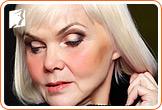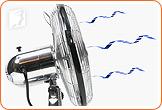
Many women seek relief from menopause symptoms, as they can cause major interruptions to daily routines. Each woman's menopausal experience is different, and the severity of the symptoms can vary considerably. Whether your struggle is mild or severe, finding relief can make a big difference in your quality of life during this time. Read on to discover how you can alleviate hot flashes and other menopause symptoms.
6 Tips to Relieve Hot Flashes
Hot flashes can become more frequent or severe if little action is taken to avoid the things that cause them. There are various environmental and behavioral factors that contribute to hot flashes, so decreasing hot flash episodes can often be as simple as avoiding the triggers

- Avoid spicy foods.
- Avoid hot drinks.
- Take cool showers, especially before bed.
- Turn down the thermostat or run a fan.
- Avoid things that create heat, like fireplaces, hair dryers, and furnaces.
- Avoid warm environments, such as hot rooms and beds with heavy blankets.
6 Tips to Alleviate Other Menopause Symptoms
Menopause symptoms, including hot flashes, are caused by unbalanced levels of estrogen, progesterone, and testosterone in the body. During menopause, the ovaries begin to prepare for the cessation of their primary roles, one of which is hormone production. Therefore, the first step in tackling menopause symptoms is trying to balance hormone levels. Here are some tips.
Eat well
Eating a balanced, healthy diet is vital in overcoming hot flashes and other symptoms. Try to incorporate all food groups, increase your intake of vitamins B, C, D, and E, and consume more soy, which will help to balance hormone levels.
Stay hydrated

Drink the equivalent of 8 - 10 glasses of water each day. This is the recommended amount in order to keep the body hydrated and functioning properly.
Avoid caffeine, alcohol, and nicotine

Excessive consumption of these substances can worsen menopause symptoms, so try to limit your intake, or stop completely. Try drinking herbal teas instead of coffee.
Exercise regularly

Try to exercise for at least half an hour a day, five days a week. Walking, swimming, yoga and cycling are all good options.
De-stress
Stress can worsen all menopause symptoms. Take time for yourself to reduce stress, practice breathing exercises, try meditation, and consider joining a weekly yoga class.
Get rest
Try to sleep for at least seven to eight hours each night. Your body recovers during rest, so getting enough during this time is vital.
More Information
Fortunately, as you improve your lifestyle and balance hormone levels in hopes of alleviating hot flashes, you will also likely reduce the occurrence of other menopause symptoms. Follow this link to find out more about why you experience menopause symptoms and what characterizes each symptom.
Sources
- Love, S. (2003). Menopause and Hormone Book. New York: Three Rivers Press.
- National Health Service UK. (2015). Hot flushes: how to cope. Retrieved January 21, 2016, from http://www.nhs.uk/Livewell/menopause/Pages/hot-flushes.aspx
- National Institute on Aging. (2015). Menopause: Time for a Change. Retrieved January 21, 2016, from https://www.nia.nih.gov/health/publication/menopause-time-change/signs-menopausal-transition



